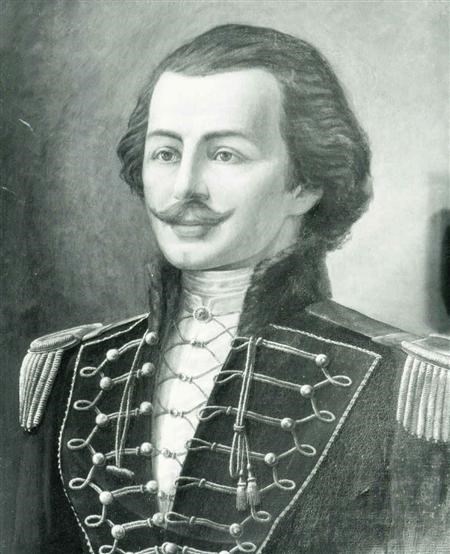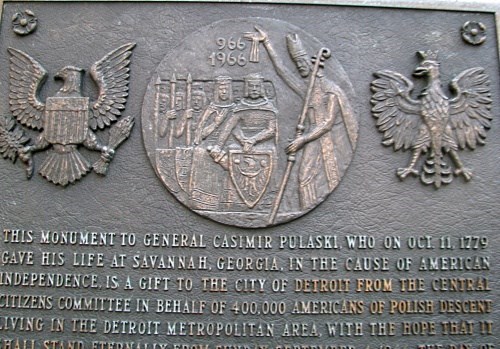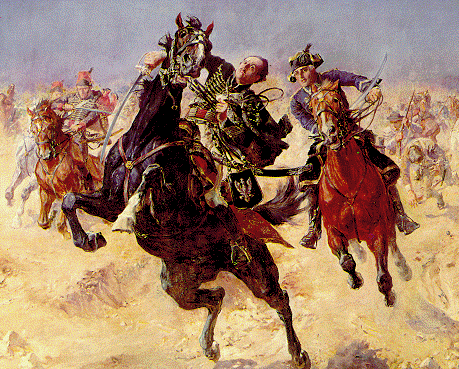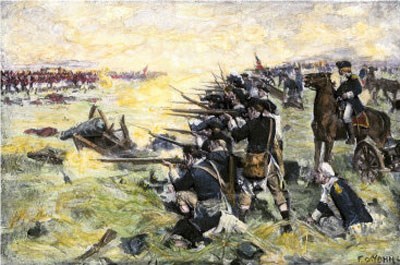 |
| (njcu.edu ()) |
"Unconsciously we all have a standard by which we measure other men, and if we examine closely we find that this standard is a very simple one, and is this: we admire them, we envy them, for great qualities we ourselves lack. Hero worship consists in just that. Our heroes are men who do things which we recognize, with regret, and sometimes with a secret shame, that we cannot do. If everybody was satisfied with himself, there would be no heroes" (Mark Twain). Casimir Pulaski was a very active man in his life. From constantly fighting for his freedom and at the same time helping others win their independence too. Even though Casimir Pulaski was physically challenged, this didn't make him any different from any other person living on this planet at that time and surely didn't stop him from achieving his constant bravery and courageousness alike that will affect the military world for generations to come.
 |
| (www.nighttraintodetroit.com ()) |
Born in the small town of Warka, Poland in 1745 on March 6th, Pulaski was constantly surrounded by war and battles right outside his own backyard. His father taught him how to shoot at the mere age of eight and began as a minor soldier at the age of twelve. After all of his training at a young age, he began looking at the world in a different perspective. Pulaski's father saw that someone had to take a stand and "...organized a group called The Knights of the Holy Cross. The Knights fought against the Russians, because the Russians were trying to take over Poland. Pulaski recruited men to be in the Knights, and he fought with the Knights. They fought bravely against the Russians, but they lost. Casimir and the rest of the Knights were captured and sent to prison. Then when he had been banished from Poland. He had left for Turkey where he, his father, and his brothers trained men to fight against Russia (Traitors, Seamstresses, and Generals: Voices of the American Revolution). Casimir Pulaski shows how even though he had been banned from his own native land, he continually trained and fought to protect his country that gave him the cold shoulder. This quote proves how he kept his optimism high and confidence humble but always got the job done. Pulaski had an excellent amount of confidence that allowed him to be preeminent in his life and as well as in his career.
Pulaski is a hero, and our knowledge of his life should serve as an inspiration to all who live free in the United States. He gave his life for the cause of American independence. He was born to wealth and privilege, and he sacrificed wealth and privilege in the struggle for freedom. He sought no personal advantage, nor any rewards; and he found none. His life is a story of reversals, defeats, deprivations and disasters; but in the end, his life was very significant to people who love freedom. And with that, I believe, Kazimierz Michael‚ Waclaw Wiktor Pulaski, is a true deserving hero.
 |
| (students.cis.uab.edu ()) |
Pulaski was one of the principal military commanding officers for the Bar Confederation and battled against Russian domination of the Polish-Lithuanian Commonwealth. With his numerous military tactics and successful sieges his name has gone down in history for one of the best European military commanders of all time. Pulaski had many successful military tactics which achieved his posthumous fame of an excellent international war commander. Not only intelligent but, .."General Pulaski, a brave warrior who saved the life of George Washington in the Battle of Brandywine and ultimately gave his own life during the Revolutionary War" (Olce's Casmir the Great). Pulaski always put his team members and alliances first before he saved himself. "I will never leave my men behind, however, when it comes between life and death, it is better for thousands to live and one to die instead of vice versa" (Cavalry Commander of the American Revolution). This proves that not only did he put himself last in his order of duties but he always protected his crew of men like his own children. With constant experiences on the battle field, Pulaski gained his own fair share of knowledge not just about which tactics will be a constant success but learned more how people respond when put under supreme amounts of pressure. Franklin was impressed by Pulaski, and wrote of him: "Count Pulaski of Poland, an officer famous throughout Europe for his bravery and conduct in defense of liberty of his country against the three great invading powers of Russia, Austria and Prussia... may be highly useful to our service." during the Battle of Savannah, that General Pulaski, charging into battle on horseback, fell to the ground mortally wounded by the blast of a cannon. Pulaski's enemies were so impressed with his courage, that they spared him the musket and permitted him to be carried from the battlefield. Pulaski died several days later on October 15, 1779, at age 34.
 |
| (www.brandywinesoldiers.com ()) |
His courageousness includes not just bravery and valor but selflessness. He was kind to anyone on his alliance teams but "Riding up and down the countryside launching lightning raids on Russian forts, garrisons, and supply depots, Pulaski quickly became famous throughout Europe for his daring attacks, hauling ass into hardened enemy bases on horseback in a blaze of musket smoke and blood-stained swords, chopping up anyone traveling slower than his steed" (Olce's Casimir the Great). He has been remembered as a hero fighting for independence and freedom both in Poland and in the United States. Pulaski never contained his confidence inside which allowed him to excel in his military career. Pulaski usually followed Congress' orders when it came to matters with George Washington however, "Casimir recommended an immediate surprise attack to take advantage of the howling blizzard that was beginning.The British were completely surprised by the charge of cavalry into their outposts and the outpost guards fell into full retreat. The snowstorm disguised the small number of cavalry and soon up to 3,000 British soldiers were retreating back to Philadelphia, abandoning supplies and equipment. Meanwhile, the impetuous Casimir's indignation mounted to the point that he wrote a letter of resignation to General Washington" (Wade Schott). When Pulaski wanted to get something done, he knew the only way that the job was done right, he had to do it himself. In regards to his personality, Pulaski never contained his confidence inside which allowed him to excel in his military career but silently backfired for the first time in his vocation.
Page created on 1/11/2013 12:00:00 AM
Last edited 1/11/2013 12:00:00 AM
